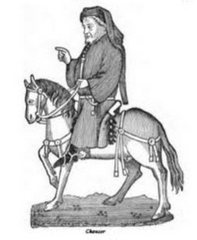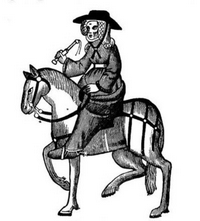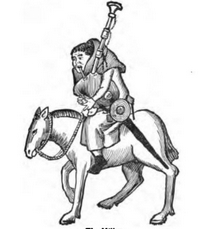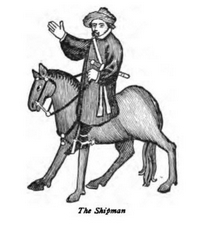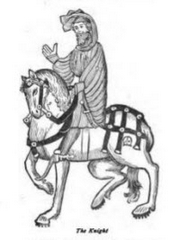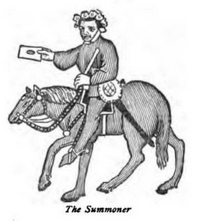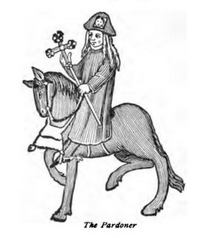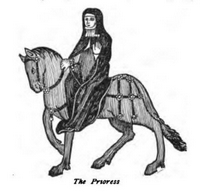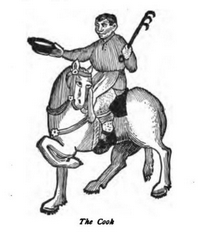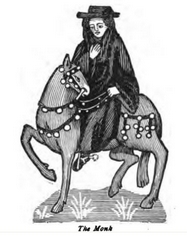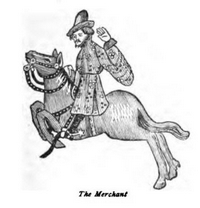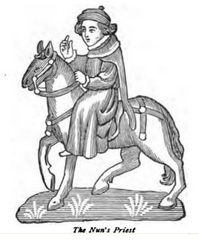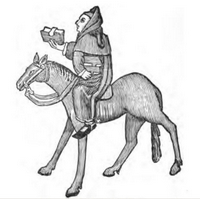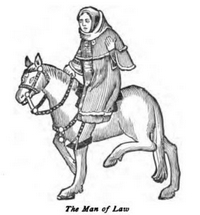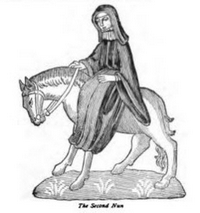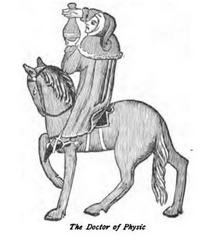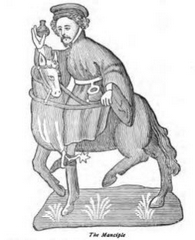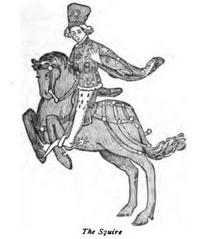The Pardoner's Tale
|
This is a website about the Canterbury Tales
Here you will find a summary and information about the The Pardoner's Tale |
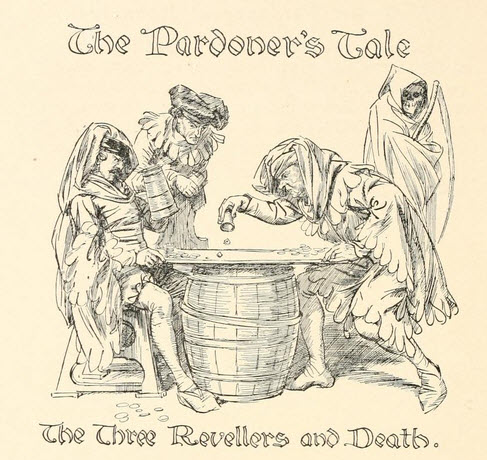
The Pardoner's Tale The Pardonerís Tale is a unique story introduced by a unique character. The Pardoner preaches against sin and avarice by quoting that greed is the root of all evil. In his introduction to the others in the Canterbury Tales, he claims he has relics that he shows when he is preaching. These relics, he admits, are fake, and that he is gripped by the very greed he preaches against. The Pardoners tale also illustrates how sin can lead to a personís downfall. The Tale The Pardonerís Tale begins with the description of young Flemish men. These men are ruffians and drunkards that live in debauchery and sin. Through his description he admonishes the youngsters for such behavior. His preaching about each individual sin, from drinking and gluttony to swearing, portrays his beliefs and profession. As the three are gathered around drinking and rioting they hear a funeral knell. One of the revelers approaches the young men and says that an old friend of theirs was slain by Death. This does not sit well with the drunken lads. They immediately jump to arms and decide to vanquish Death. They set off at once to find and kill Death. During their travels they meet an old man in tears. He claims he has traveled the world searching for Death to take him, as he is old and weary. The youths become enraged by hearing the name Death demand to know where he hides. The old man tells them to search in a nearby grove, that he just left Death under a large oak tree. The three men take off to slay Death. When they approach the oak tree they find eight baskets of gold coins. The drunks find that nobody is watching the gold and decide to take it for themselves. One of the young men is sly and determines he can outwit the others. He suggests that if they take the coins into town during the middle of the day they would be seen as thieves. Since they must wait for night fall, they draw straws to see who will go into town and get food and wine. One lad goes off to town to gather the nights entertainment. When he is gone, the sly one tells the other that if they kill the man on his return they will be able to split more gold. They agree and immediately plan to create a trap. The youngster on his way to town has similar thoughts. He purchases the wine, but puts strong poison in two of the bottles. At this point in the Pardonerís Tale, the young man returns and is killed by the two treacherous ones. Each boy grabs a bottle of wine to celebrate their new found fortune. Unfortunately, they both choose a poisoned bottle and end up dead within moments. The old man is thusly correct, Death truly is under the oak tree, but it is not a person, but the treachery of the young drunkards. The Pardonerís Tale concludes with the advice to avoid sin and averice as they will surely lead to death. The Interpretation The Pardonerís Tale is an interesting, wry comedy that at once preaches against sin, but is sluiced in sin. The Pardoner tells about his evil deeds and appears to perversely enjoy taking advantage of people. His preaching in the beginning of the tale is the very vices he portrays in his prologue. The overall goal of the Pardoners tale is to illustrate his moral of how greed is the root of all evil. This applies to the story and his preaching, but does not affect his life or amoral actions. The Pardonerís Tale focuses on three men who hunt for Death. They find justice duly served by finding death from each otherís hands. The interpretation is twofold. Of course, the greed that drives the men to killing each other is greed. This greed is illustrated as the root of all evil. Chaucer depicts the character as a pious man who preachers, even though he is corrupt. This can be taken as a stab against the church. Another part of the interpretation that is often overlooked is the hunt for Death. The old adage of seeking death and death finds you rings true in the Pardonerís Tale. The old man that has searched for Death all over the world, is in fact Death. The three drunkards do not understand the task they take on when attempting to vanquish Death. Chaucer uses the tale to illustrate that nobody can escape death. The lads in the Pardonerís Tale meet death and are outwitted by the old man. Death also uses mans inherent greed to vanquish themselves. The idea of Death being an entity has been used throughout history. The concept of destroying death, or outwitting death echoes in the Pardonerís Tale. In a sense, this concept lends itself to another form of greed, and that is immortality. While this is not the goal of the three young men, Chaucer uses the analogy to illustrate manís desire to overcome death and be immortal. Destroying death is of course impossible, and serves only to show that those who seek death shall surely find it. Sin and avarice are the main points of the Pardonerís tale. The tale is often used by preachers to illustrate the vices that can lead to death. One can assume that the Pardoner, having covered his own profession, has practiced this tale several times. This is reinforced by the rote of telling the others about the relics after the end of the Pardonerís Tale. The tale shows how greed can lead to disastrous outcomes, and the inherent treachery in man. This concept is reinforced in the Pardoners own malpractice. Overall, the Pardonerís Tale exemplifies how sin and treachery are the vices to avoid. Even though the tale is well meaning, the Pardonerís treachery gives the tale a different light. He has accepted the very fate of the three men by practicing the sin and guile he preaches against. The pardoner plays the role of the sly man, but has not found Death yet. Perhaps the Pardoner is still searching the world for Death. Either way, the Pardonerís Tale is a great portrayal of the dichotomy of man. Canterbury Tale Summaries
Sponsors: |
|
